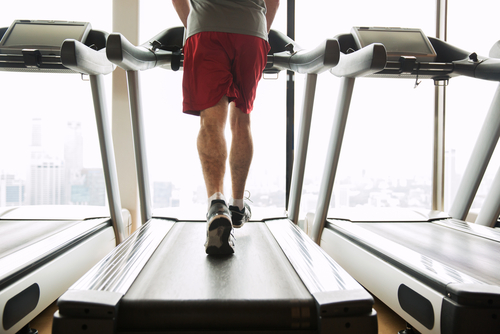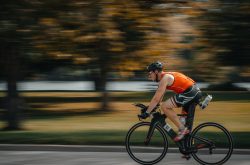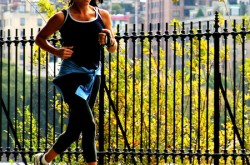By: Debbie Lui
Fitness walking is quickly becoming a favorite exercise for all ages. This a low-intensity activity is not only a perfect way to start an exercise routine, but it is also an inexpensive and simple way to stay fit! In fact, Harvard Medical School describes walking as “the simple cure for the biggest health problem in America”.¹ It sounds easy enough but, just like any other exercise, there are plenty of ways to go wrong! We’ve gathered our top tips to keep you injury-free, safe, and seeing the results you want!
Benefits of Fitness Walking
Diet is king when it comes to weight loss and weight management, but exercise is also an important and effective tool. Numerous research studies support walking as one of the best exercises for weight loss because of its accessibility for those of all fitness levels, the low cost of participation and the reduced risk of injury compared to other, more high-impact forms of getting fit. But, out of the health benefits of fitness walking, and you may find some of the findings surprising!
- It can help reduce your chances of becoming obese!
According to Harvard¹, a brisk 90-minute walk can reduce the effects of certain genes linked to obesity by nearly half! - It’s easy on your joints!
Often, walking is the first exercise recommended to those who are overweight. Especially if you are elderly or have had joint issues, exercises that are less intense are good for preventing knee and joint pain due to pressure and impact. - It improves muscle strength + endurance!
Many of us work desk jobs that require sitting for 8+ hours per day, and that 30-minute workout might not be enough to offset the loss in muscle strength + endurance that comes from a sedentary day. Walking is a great way to get those muscles activated and working with a lesser risk of injury!
Not only can walking improve your muscles, joints, and assist in weight management, but it can also help you avoid other health issues such as hypertension, high cholesterol, joint stiffness, and poor immune function. Interestingly enough, it has also been shown to help tame a sweet tooth¹,²!
Fitness Walking Tips:
Find Good Support
Just like in running, find a pair of shoes that fit well and offer the right amount of stability and support is important. Not only will this help make your walks comfortable, but the right shoes will help prevent injuries such as shin splints or ITBS and can help rectify any form issues you may have.
If you know you have knee and/or joint problems, opting to walk on grass or indoor running tracks instead of sidewalks may offer additional support.
Warm Up + Cool Down
Even though walking may seem like an easy workout, it is still important to ease your body into it. Always warm up by walking at a slow or normal pace for 5-10 minutes before picking up the tempo of your workout. After warming up a bit, take time to incorporate some dynamic stretches!
The same goes for your post-walk cooldown. To avoid muscle soreness and tightness, take the last 5 minutes of your walk to slow down and let your heart rate settle before diving into some static stretches.
Form Is Key
As with any other exercise, there is a right + wrong way to do it. Keeping the correct posture and form will help ensure your body doesn’t cut corners and shave calories off of your workout! Here are a few things to keep in mind:
- Look forward, not down.
- Maintain a neutral neck position to prevent neck pain by keeping your chin pointed down and pulled in slightly.
- Keep your shoulders back and down and relaxed to allow your arms to swing naturally.
- Keep your belly button gently sucked in toward your spine to activate your core and protect your lower back from injury.
- Walk with your heel striking the ground first, then roll onto the ball of your foot, and push off with your toes. This is called the heel-toe method.
Visit The Fitness Walking Guide to learn more!
Mind Your Heart Rate
Most of us wear a fitness tracker of some sort, and many of them come with a wrist-based heart rate monitor. Keep an eye on this to ensure that you’re putting forth enough effort to see results! It may be helpful to identify a target heart rate and check periodically to make sure you’re where you need to me.
Track Your Progress
Those fitness trackers will also keep track of the number of steps, distance, speed, and sometimes cadence of each walk. Many find it helpful to set a goal for one of those measurable metrics so they can stick to their plan, track progress, and hold themselves accountable!
If you wish, you can wear your fitness tracker throughout the day to track your walking steps in a day or simply strap it on when you’re heading out for a brisk walk. The choice is yours! The recommended number of steps per day is 10,000 steps or more.³ At the end of the day, you may be surprised with the number of steps you have taken.
Start Slow
Begin at a low-intensity level or choose the level that fits your current physical activity. In the beginning, you can start with walking for 30 minutes or less. Once you are comfortable with the intensity and duration, you can gradually increase the intensity by walking up hills, with weights, increasing speed, or increasing distance!
Mind the Weather
Make sure you carry water if you are walking long distances or are exercising in hot weather. Keeping cool is important, especially when walking longer distances! It’s helpful to bring a hat with a brim + to apply sunscreen to exposed areas as well. Keep in mind, walking indoors is a great idea when you can expect extreme weather!
Fitness walking can be an enjoyable way to add more exercise into your day as you enjoy the late summer days. Of course, walking is always more fun with a buddy! Try searching for walking groups near you or asking a friend (four-legged or otherwise!) to come along.
Tell us what you love about fitness walking the most!
We would love to hear from you, so leave us a comment below.
健身步行貼士
如果你正在尋找一種強度低的運動來開始你的日常鍛煉,或者你正在尋找一種便宜且簡單的健身方式,健身步行是你要找的答案!步行聽起來非常簡單,但跟其他運動一樣有許多健康好處。哈佛醫學院(Harvard Medical School)描述步行是解決美國最大健康問題的簡單方法。即使是一種簡單的運動也可以幫助你邁向健康目標。如果你將任何一種運動變為習慣,你會開始看到它最終帶來的好處。在這篇網誌中,你會了解到健身步行的好處以及健身步行技巧。健身步行聽起來很容易,但跟任何其他運動一樣,如果你沒有在適當保護下進行,或會使你受傷。我們為你提供一些安全貼士和建議,讓你的步行旅程更加愉快和安全!
健身步行的健康好處
眾所周知,運動已成為預防和治療肥胖的有效工具。有持續的研究支持步行是減重的最佳運動之一。以下是健身步行的一些健康好處,你可能會覺得這些研究發現驚人1。根據哈佛大學的研究,走路可以抵消促進體重的基因的影響。他們發現,通過快走半小時,這些基因帶來的影響減少了一半。步行通常是推薦給超重者的首種運動。特別是,如果你是老年人,或者曾有關節的問題,最好先進行一些不太劇烈的運動,以保護你免受因壓力引起的膝和關節疼痛。步行不單可以提高肌肉力量和耐力,它還可以改善高血壓,高膽固醇,關節僵硬,增強免疫功能,有趣地它還可以幫助減低對甜食的欲望¹,²!無論你是喜歡走路還是想透過走路減重,健身步行對整體健康來說是有益身心的活動!
健身步行小貼士:
1)找一雙適合並提供良好支撐的鞋子。走在草地或室內跑步徑上而不是石矢地上。
2)在開始步行前,以慢速或正常步行速度行走5分鐘熱身。結束步行後同樣減慢速度5分鐘。
3)用適當的姿勢走路很重要,可按這裡了解更多。
4)留意你的心跳和呼吸。如果可以,使用便攜式心臟監護儀。不要急於加快速度,適整速度已配合身體所需,或在需要時休息。
5)追踪你的進度。步行時配戴計步器有助於在步行期間測量你的步數。如果你想,你可以全天戴著,以計算一天內的步數。為達到健康效益,每天累積的建議步數為一萬步或更多。記錄你的運動日誌能使你更容易堅持你的計劃並實現目標。在一天結束時,你可能會對你在一天中所步行數字感到驚訝!
6)從低強度級別開始或選擇適合你的級別開始。在開始時,你可以步行30分鐘或更短時間。如果你對當前的強度感已適應,你可以通過上斜路,增加手上重量或增加步行速度和距離來逐漸增加步行困難。
7)如果你計劃走較長的路程或在炎熱的天氣下走路,請確保攜帶水。
8)在炎熱的夏天,不要忘記戴有帽簷的帽子,並塗上防曬霜。請記住,在室內散步總是另一種選擇,這在遇到惡劣天氣時是一個好的選擇。
9)散步可以很有趣。如果你覺得無聊,可以嘗試找另一條步行路徑。
如果你有任何疑慮,有疾病或有傷,你應該在開始前諮詢你的私人教練。
健身步行可以非常愉快,花一些時間在戶外散步,享受周圍的環境。但是,如果你的行程非常繁忙,你可以將步行融入日常活動中,例如步行到下一個巴士站,早一個車站下車或選擇更長的路線回家或辦公室。如果你想要一個拍當作為運動夥伴,這可以邀請你的朋友,甚至你的狗一起步行!
與你的朋友和家人分享這篇網誌,並邀請他們下次與你同行!
告訴我們你最喜歡健身步行的什麼?我們很想聽到你的意見!歡迎在留言給我們。
資料來源:
- https://www.health.harvard.edu/staying-healthy/5-surprising-benefits-of-walking
- https://www.betterhealth.vic.gov.au/health/healthyliving/walking-for-good-health
- https://www.betterhealth.vic.gov.au/health/healthyliving/walking-for-good-health





Comments (0)